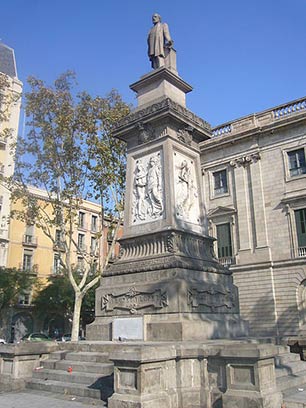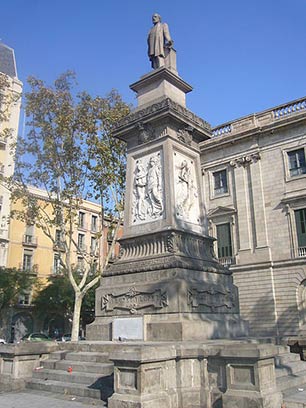Did you know that Truthout is a nonprofit and independently funded by readers like you? If you value what we do, please support our work with a donation.
 The statue of Antonio López y López in Barcelona. The statue of the businessman, whose wealth was acquired through the trade of enslaved peoples, is set to be removed after years of struggle led by community and anti-racist groups. (Photo: Jordiferrer / Wikipedia)Argentina has replaced a statue of Christopher Columbus with a statue of Bolivian war of independence heroine Juana Azurduy. The decision to replace the statue of Columbus marks another victory, however limited or symbolic, in a long line of changes to both monuments and holidays in various places throughout the Americas, including the renaming of October 12 as Indigenous Peoples’ Day rather than Columbus Day.
The statue of Antonio López y López in Barcelona. The statue of the businessman, whose wealth was acquired through the trade of enslaved peoples, is set to be removed after years of struggle led by community and anti-racist groups. (Photo: Jordiferrer / Wikipedia)Argentina has replaced a statue of Christopher Columbus with a statue of Bolivian war of independence heroine Juana Azurduy. The decision to replace the statue of Columbus marks another victory, however limited or symbolic, in a long line of changes to both monuments and holidays in various places throughout the Americas, including the renaming of October 12 as Indigenous Peoples’ Day rather than Columbus Day.
This latest move in Argentina also comes amid ongoing controversies over the Confederate flag in the United States, where several monuments to Confederate figures have been defaced as symbols of racism. Similarly, in South Africa, the growing Rhodes Must Fall movement has challenged the continued presence of monumental apartheid figures.
While Spain is nowhere close to questioning its relationship to Columbus as a figure, nor to the narrative of discovery and racism, a small success was achieved in July when the new municipal government of Barcelona finally agreed to rename the Antonio López Plaza. The reason for the renaming, however, requires more consideration.
Antonio López y López is commonly known to Spaniards as the Marquis of Comillas, a businessman who made his fortune in trade with Cuba. Yet what allowed López to acquire his wealth – and later, power – within the Spanish state in the first place was his role in the trade of enslaved peoples. Anarchists first destroyed the original statue in 1936, but a new monument was erected shortly after by the fascist regime of Francisco Franco. The statue and the square thus represent a colonial as well as a fascist presence in the cityscape of Barcelona.
After years of struggle, led by community organizers from anti-racist groups, immigrant movements and pan-Africanist groups, the new mayor, Ada Colau, agreed to negotiations and has confirmed the statue will be removed and the square renamed. Colau herself emerged from the housing rights movement against the continued eviction of residents due to predatory bank loans. Her decision to rename the plaza is a welcome development. Yet, we should also be attentive to her reasoning behind such a decision, and more importantly question the process of how the square will be renamed and who will be allowed to participate in such process.
For activists, this presents a preliminary success toward opening up a conversation about Spanish colonialism; the kidnapping, transport and enslavement of people from the African continent to the Americas; and the ensuing legacies of each, manifested in part in institutionalized racism and the systematic incarceration of undocumented migrants to this day. Does the decision represent the same conversation for Colau? And what role does this history play in renaming the square?
While a step in the right direction, we should understand the renaming of the plaza and the removal of the statue was made possible in this case precisely because of their direct link to fascism rather than because of López’s racial and colonial crimes. As members of a newly formed left-wing government, both Colau and Manuela Carmena (the new mayor of Madrid) have expressed interest in removing traces of the Spanish fascist past from their cities. Yet historical memory should go beyond the last 40 years and investigate the ways in which naming – and unnaming – masks and covers up current racial injustice within Catalunya and Spain.
The movement to remove the statue of Antonio López has been supported by different civil groups. Yet it has been communities of color who have been organizing for the past decades. While UGT (Union General de Trabajadores/General Workers Union) and CCOO (Comissiones Obreras/Workers Commission) suggested renaming the square after Spanish anarchist and educator Francesc Ferrer i Guàrdia, more mainstream anti-racist organizations have suggested renaming it after Nelson Mandela.
Mandela of course represents an important figure in history, whose name and legacy stands for resistance and the struggle for equal rights. Yet, it is important not to dislocate the conversation from Spain on to a broader debate on universal rights for all. While Mandela is a towering world-historical figure in his own right, critics (including many from South Africa) have nonetheless noted that memorializing Mandela often has served a dual purpose, simultaneously celebrating his achievements and papering over the inability of various societies to grapple with their own racial and gendered colonial histories and subjects by displacing local grievances onto the honoring of a global human rights champion.
The Spanish pan-Africanist movement (a central force in pushing for a name change), on the other hand, has suggested naming the square after Alfonso Arcelin, a Haitian-born Spanish doctor. Arcelin was instrumental in fighting against the controversial exhibit “el negro de banyoles,” at the Darder Museum, where the body of a young Black man that had been mounted by the Verreaux brothers in 1830 was displayed until the 1990s without much controversy until Arcelin’s intervention. Most likely from Botswana or southern Africa, the body was of a “Betjuanas chief,” according to Verreaux, though later sources say the man may have been part of the Batlhaping nation. Catalan naturalist Frances Darder purchased the body from the Verreaux collection in 1888. Arcelin called for its removal as an exhibition in 1992 and also demanded the remains to be repatriated for reburial. After a six-year-long legal battle (and much public controversy), the museum finally removed the exhibit and the body was repatriated. Arcelin, as a prominent Afro-Spanish activist and doctor in Spain, was invested in fighting institutional racism in Spain that linked racism today with its colonial past.
If the mapping and naming of the city layout, monuments and plazas represent a colonial site that parallels the managing of bodies in the colonial past, then it would be important to acknowledge that history. As such, here the words of sociologist Boaventura de Sousa Santos to “expand our sense of the present and contract our future” ring true. Barcelona, and Spain more broadly, should recognize not just its implication in a history of fascism, but also slavery and colonialism. Its self-reflection, manifested through such renamings, should include the colonial histories and territories of the past 520 years.
Moreover, if Spain continues to be both the beneficiary and perpetrator of an entrenched racial colonial present, then the people who continue to resist such violent logics should have a say in the current processes addressing the representation of history through the renaming of public spaces. In that sense, Arcelin, for example, would be a fitting replacement, though the process should involve discussions with the various groups that have pushed for the renaming of the plaza and removal of the Antonio López y López statue.
As Jessica Namakkal has noted, “History has the power to establish the status quo, but it [is] also the duty of historians to expose the cracks in the monotonous façade.” Barcelona and Ada Colau have a monumental opportunity to be on the right side of history. We have a political and moral duty to make sure they make the right decision.
Trump is silencing political dissent. We appeal for your support.
Progressive nonprofits are the latest target caught in Trump’s crosshairs. With the aim of eliminating political opposition, Trump and his sycophants are working to curb government funding, constrain private foundations, and even cut tax-exempt status from organizations he dislikes.
We’re concerned, because Truthout is not immune to such bad-faith attacks.
We can only resist Trump’s attacks by cultivating a strong base of support. The right-wing mediasphere is funded comfortably by billionaire owners and venture capitalist philanthropists. At Truthout, we have you.
Truthout has launched a fundraiser, and we have only 24 hours left to raise $15,000. Please take a meaningful action in the fight against authoritarianism: make a one-time or monthly donation to Truthout. If you have the means, please dig deep.
